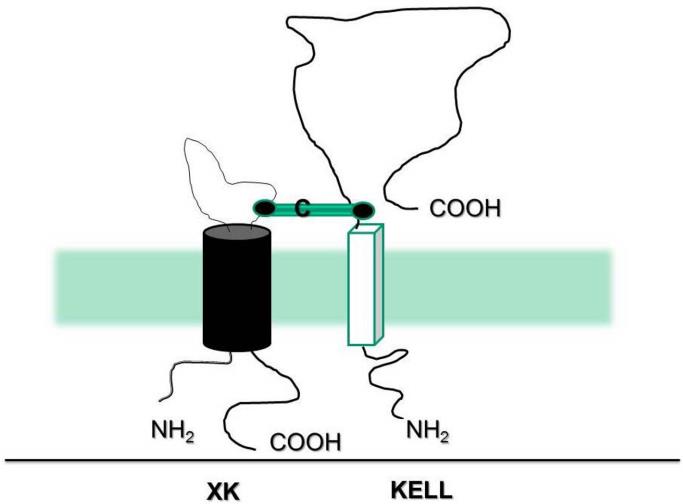NAA Services for Anti-K Antibody
Multiple transfusions in thalassemia patients may lead to natural autoantibody (NAA) production against blood group antigens. It is sure that Rhesus (Rh) and Kell (K) blood group phenotyping in a newly diagnosed thalassemia patient and selection of matched blood for transfusion is very important. Based on our years of experience and advanced platforms, Creative Biolabs is confident in offering the best and most suitable NAA-related service against anti-K antibodies.
Background of Anti-K Antibody
The Rh and Kell blood group system antigens are strong immunogens. Kell antigen (K antigen) system is a group of antigens on the human red blood cells (RBCs) surface which are important determinants of blood type and are targets for autoimmune or alloimmune diseases. Found within the Kell protein, Kell antigens are important in transfusion medicine, autoimmune hemolytic anemia, and hemolytic disease. Anti-K belongs to IgG class alloantibodies, which is one of the most common immune red cell antibody in the ABO and Rh system.
Before beginning chronic blood transfusion as well as selective transfusion of leukoreduced and phenotypically matched RBC units for Rh and Kell antigens, determination of RBCs phenotype may help reduce the alloimmunization rate. Blood samples of β-thalassemia patients are normally collected and tested for autosensitization with direct antiglobulin test (DAT). The presence of the above clinically significant alloantibodies is a bad indicator for the situation of blood transfusion. Anti-K is the most prevalent alloantibody in thalassemia patients, suggesting the potential as an effective biomarker for the diagnosis of thalassemia.
 Fig.1 Structure of the transmembrane Kell glycoprotein (XK) and the Kell proteins.1
Fig.1 Structure of the transmembrane Kell glycoprotein (XK) and the Kell proteins.1
The Role of Anti-K Antibody in Thalassemia
Thalassemia is a genetic disorder where the production of normal hemoglobin is fully or partially altered because of a defective synthesis of globin chains. β-thalassemia is a severe, progressive anemia, which needs regular transfusions for life expectancy. One of the most important complications of regular blood transfusions is autoimmunization and alloimmunization. Different rates of alloimmunization to RBC antigens have been reported in β-thalassemia major patients ranging from 2.87% to 37% in various studies. In patients with thalassemia, the most common antibody was anti-K, followed by anti-D, anti-C, anti-E, anti-C, anti-E, anti-JKb, and anti-Cw. Typing patients and donors to match for Rh (E, c) and Kell (K) antigens would prevent more than 90% of RBC alloantibodies and reduce the frequency of transfusion in thalassemia patients.
What We Can Do?
With years of experience, Creative Biolabs can provide a whole set of services for the detection and profiling of anti-Kell autoantibodies. In addition, we also provide other NAA services, such as the detection of autoantibodies repertoire, the discovery of novel disease markers, the development of disease diagnosis, etc. Aided by our professional scientists, a wide spectrum of NAA products is ready-made for your choice.
Features of Our Services Including but Not Limited to
- Newer immunometric assays with high accuracy and high specificity
- Higher sensitivity potential to detect very small amounts of autoantibodies
- Shorter turnaround times to make sure your time budget
- Best after-sale service
Blood transfusion is a standard therapy for severe anemia in patients with intermediate β-thalassemia syndrome. It is advisable to screen the patient’s phenotype and matches the suitable red cells. Having worked in the field of NAA research for many years, Creative Biolabs is able to provide our worldwide customers with high-quality anti-K services for RBC phenotype. Our professional scientists will do their best to meet every customer's requirements. Please feel free to contact us for more information.
Reference
- Watkins, Casey E., et al. "Chronic granulomatous disease, the McLeod phenotype and the contiguous gene deletion syndrome-a review." Clinical and Molecular Allergy 9.1 (2011): 1-6.
Related Services:
- NAA Services for Anti-Alloantibody Xg
- NAA Services for Anti-E Antibody
- NAA Services for Anti-C Antibody
- NAA Services for Anti-JKᵇ
- NAA Services for Anti-Alloantibody Cᵂ
- NAA Services for Anti-Alloantibody D

